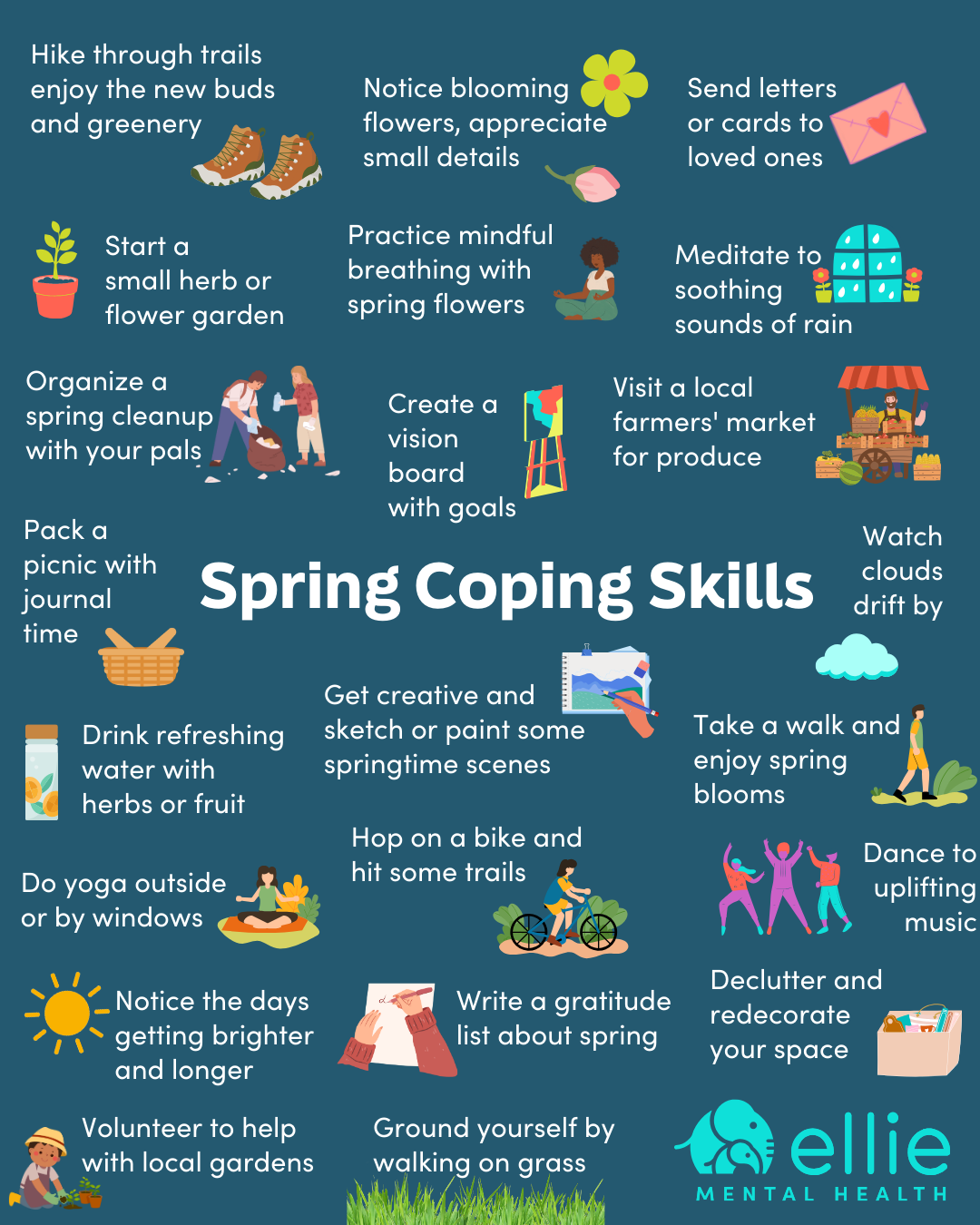What is Mental Health Spring Cleaning?
Spring cleaning is typically a time of thoroughly cleaning our homes, ridding them of any items you do not want to take into the new season. This may look like reorganizing your closet, deep cleaning, or selling old items. Have you ever considered mentally spring cleaning? Mental spring cleaning is a beneficial way to get a fresh start on regaining control of your overall well-being. This is an opportunity for one to shift and reorganize your thoughts, emotions, and patterns that you find are no longer serving you, and there’s no better time than the springtime!
As you evolve, you may notice negative patterns or bad habits that you have carried with you throughout various seasons of your life and often struggle to figure out how to clear your head. Some of these habits may have positive effects, while others can leave a negative impact on your relationship with yourself and others. When looking to mentally spring clean, it comes with recognizing these habits and acknowledging the ways in which they have played a role in personal development.
Research shows that it can take anywhere between 18 to 254 days to break a habit. But don’t worry! Breaking a habit or reshaping behaviors requires a level of self-compassion, grace, and understanding that you aren’t on any specific timeline. Often times, we begin to compare ourselves and lose sight of our own journeys which can create barriers for us when attempting to break a negative habit. But, it’s not impossible. All you have to do is start!
As you enter the spring season, take some time to consider some habits or patterns that you want to throw away.
3 Habits to Let Go of This Season:
1. Holding on to Past Relationships
Many times, we hold on to relationships that no longer serve us, out of fear of starting over and the history of the relationship. This can be reflective of the difficulty of setting and maintaining healthy boundaries for ourselves, and others, which can hinder our progression and growth. Consider ways in which you would like to reestablish healthy and meaningful relationships by setting expectations and boundaries, as well as reflecting on areas of self-improvement.
2. Being Self-Critical
Have you heard the saying “You’re your own worst critic”? There is no denying it. While being self-reflective and aware can be beneficial to your growth, being excessively critical of yourself can have a negative impact on your mental health. This can increase your chances of anxiety and depression, as well as alter your self-esteem.
Here is a useful resource to further explain the psychology behind self-criticism, and ways it impacts our overall mental health.
Implementing positive daily affirmations to reframe negative self-talk can be a prominent way to improve your sense of self, and work toward more positive self-talk. This article shares why repeating affirmations is helpful in reprogramming our subconscious and shifting the perspective we may have on our stressors and worldviews.
3. Procrastination
When procrastinating, we tend to push off important tasks and become increasingly stressed due to the overwhelming load of the task. Sometimes, just the thought of a task feels so heavy that we find it difficult to even begin. This can lead to missed deadlines, increased workload, and intensified anxiety rooted in fear of failure. Some helpful tools to reduce the chances of procrastination include setting measurable goals for the day, using timers, eliminating distractions, and rewarding yourself. We all have unique methods that may be beneficial to us in order to achieve tasks and goals. Don’t give up when one method doesn’t work. Continue implementing new ideas until you find the one just for you.
How to Build Healthier Habits this Season

Journaling in the Fresh Air
- Write it out: Choose an outside space to journal and simultaneously soak in Vitamin D. This can boost serotonin levels, which boosts our mood. This can be useful as you release and navigate your thoughts and emotions on paper. Take a few minutes each day to write down what’s on your mind, and let it flow freely without judgment. This can clear mental space, as well as promote a longer attention span.
- Identify mental clutter: Think about the recurring thoughts, worries, or stresses that keep popping up. The more aware you become of these patterns of thoughts, the easier it can become to manage them. Write down these patterns and thoughts and reflect on where you have seen them show up in your interpersonal relationships. This can help you not only take more accountability for your behaviors but also take the front seat in establishing alternative behaviors and reframing negative thoughts.
Fight Against Procrastination
- Set Timers: Set a timer ranging from 5-15 minutes to allow yourself increments of time to complete tasks. This can reduce the chances of feeling overwhelmed and not being inclined to accomplish goals, which then results in less procrastination.
- Create a To Do List: Create a to do list in efforts to organize and prioritize your day-to-day responsibilities. This can be on your phone, or a tangible list that you place on your refrigerator, desk, or any area that is easily accessible. To-do lists are helpful ways to keep up with anything you need to get done, but also a way to decrease the pressure of accomplishing larger tasks, opposed to smaller and minimal ones.
Declutter Your Social Media
- Limit Anxiety Inducing Content: Remove or unfollow social media platforms that create an algorithm of content that are likely to increase the chances of experiencing anxiety. This can be news outlets, gossip blogs, or content creators whose pages highlight current events and daily alerts regarding disparaging news.
- Fasting: Take a deliberate break from social media for a specific amount of time. To get the most out of fasting, find additional hobbies or activities that can productively fill the time typically dedicated to social media.
Improve Sleep Quality
- Establish Bedtime Routine: Giving yourself an intentional cutoff to begin your bedtime routine can increase discipline and consistency in improving your sleep quality. This routine can include a bubble bath, reading, journaling, or any activity that involves you settling your mind and body.
- Limit Doom Scrolling: Scrolling excessively on our telephones and limit the amount of quality sleep we are able to receive. By limiting the amount of time we spend scrolling before bed, we are training our brains to recognize that we are winding down, and this can also allow us to develop healthier bedtime routines.
Practicing Gratitude
- Create a Weekly Gratitude Ritual: End your week with a form of ritual that involves identifying at least three positive things that occurred during your week. These things can be both personal and career driven but are used to balance potential negative interactions that can distract us from being grateful.
- Celebrate Small Wins: Acknowledge and celebrate your progress, no matter how big or small. This can aid in boosting your self-confidence as well as assist you in measuring your progress and staying present.
Spring is not the only season where mental decluttering can be useful. These tools can be used throughout the year as needed and become daily habits with consistency and persistence. Give yourself a moment to inhale and allow yourself to take the leap to forming better habits. While it can be challenging initially, soon you’ll see the positive impact that spring cleaning provides. Challenge yourself to one week of implementing at least one of the tips provided above. After you’ve done this, increase the number of tips you choose to implement. Eventually, you will find that slowly adding these tools to your regime will become more manageable and a consistent habit.


